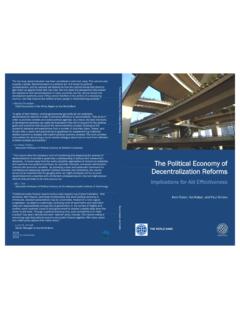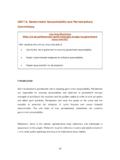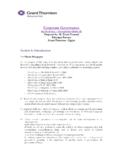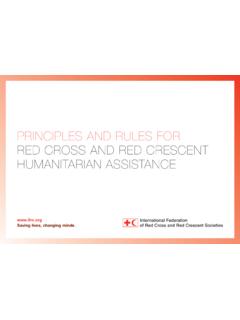Transcription of Proposal for the Knowledge Platform of the Global ...
1 Proposal for the Knowledge Platform of the Global Partnership for social accountability Fundar, Center of Analysis and Research First version May 24th, 2013. Revisited version July 22nd, 2013. Executive Summary The Proposal that Fundar, Center of Analysis and Research (Fundar) is presenting for the GPSA's Knowledge Platform draws on our own experience in carrying out social accountability projects; in designing, implementing and delivering learning platforms; in organizing peer learning and exchange face- to-face events; and in participating in international and regional networks, many of which promote civic engagement, participation, transparency, and social accountability .
2 Over the years, Fundar has gained Knowledge and practical experience not only on social accountability , but also on what promotes and encourages an effective learning, networking, and peer-exchange among practitioners in international initiatives, especially in the Global south. The GPSA's Knowledge Platform will be integrated by four functional modules: Knowledge Repository, Learning, Networking, and Knowledge Exchange, aimed at providing access to Knowledge , facilitating learning, supporting networking, and sharing experiences. Module 1. Knowledge Repository The Knowledge Repository will have the following two goals: a) contribute to facilitate GPSA's grantees and other CSOs' access to relevant Knowledge on social accountability , helping them to strengthen their capacities and work; b) be a useful space for GPSA's grantees and other organizations (CSOs, donors, thematic networks, etc.
3 To store their own materials (for example, the Repository might include reports and case studies of a particular GPSA grantee or of other CSOs working on social accountability ). To guide the mapping and selection of materials hosted in the Knowledge Repository, we will create a framework, which will identify the various topics (health, education, advocacy strategies, etc.) and types of materials (toolkits, case studies, videos, etc.) that GPSA KP users might be interested in. This framework will be created taking into account the social accountability current state of the art, GPSA grantees'.
4 Knowledge and learning needs, and feedback provided by experts on social accountability . This framework will guide the mapping and selection of materials contained in the Repository, ensuring that its content is relevant and strategic to potential users. The Repository's population of content and materials will be incremental and on-going. Initially, we will post a fair amount of relevant high-quality materials for each theme and category. Over time, we will be mapping and bringing more materials to the Repository, ensuring that there is always new Knowledge available in it and that, at the beginning and throughout the GPSA KP implementation, we allocate equal or even more time for supporting networking and Knowledge exchange activities.
5 The materials and information in the Repository will be organized and could be accessed through different categories, for example, Type of Materials -Toolkits, Guides, Case Studies-, Regions -South Asia, Latin America, Northern Africa-, Themes -health, poverty, water-, etc. The categories will facilitate the search of materials for those users looking for specific topics or type of information. Alternatively, the Repository will also have a search box (semantic search engine) where users can look for information using key words. To provide users with a way to assess if a particular material is useful to him/her, each material in the Repository will have a brief description of it.
6 The Repository will not only be a place for users to search for materials and Knowledge , but will also be a space for GPSA grantees and other actors to store and disseminate their own materials. To facilitate this process and control the materials' quality, there will be an option in the Repository allowing users to send us the materials they would like to update in this space. Finally, the Repository might also include links to other Knowledge repositories in existence to help link users to other reputable and high quality sources of Knowledge . Module 2.
7 Learning The mail goal of the Learning module is to improve GPSA grantees and other CSOs Knowledge and work on social accountability through structured learning activities. The activities for this module, which can include online courses, webinars and chat rooms with experts, will be designed by Fundar in close collaboration with the World Bank Institute (WBI) taking into account primarily GPSA grantees learning needs. Although some of these activities will be delivered by Fundar in- house experts, we will also seek to engage experts and practitioners from the WBI, the GPSA Global Partners, Fundar's partners, the GPSA grantees themselves, and organizations with proven expertise.
8 To complement the learning activities of the GPSA KP, we will also post and disseminate information on learning activities delivered by other reputable organizations and initiatives we participate in or are aware of. The technological solution we are designing for the Learning Module allows for these activities (online courses, chat rooms, and webinars) to be delivered within the GPSA KP Platform . This brings at least three advantages. The first is that we can deliver our own learning activities within the Platform without the need to resort to external technological solutions, which also eases the process of collecting the website's analytics or solving technological issues arising.
9 The second advantage is that we can partner with other organizations to deliver these activities and use our own space to carry them Finally, we can also offer our space to reputable organizations that want to deliver a particular learning activity, but that do not have a space themselves. The Learning Module will operate under four key principles. First, it will be user-based meaning that we will choose and design the contents of the learning activities primarily by taking into account GPSA. grantees and other potential users learning needs. Second, as mentioned before, the learning Platform activities will be delivered by social accountability experts coming from Fundar, but also seeking to engage experts and practitioners from the WBI, the GPSA Global Partners, Fundar's partners, and organizations with proven expertise.
10 Third, the learning activities will also be designed by experts on online learning and drawing on Fundar's past experience. This will ensure that appropriate pedagogic methodologies are used and that participants engage in the learning activities until completion. Fourth, all learning activities will have an adequate follow up and be assessed by users to identify outcomes, usefulness, aspects to improve, etc. We envision surveys to be applied during and after completion of the learning activities. Module 3. Networking The goal of the Networking module is to provide KP users with improved access to other social accountability peers and experts and to opportunities for collaboration and interaction with them.















